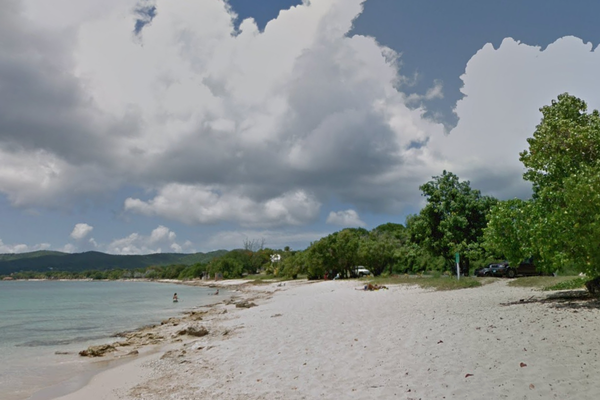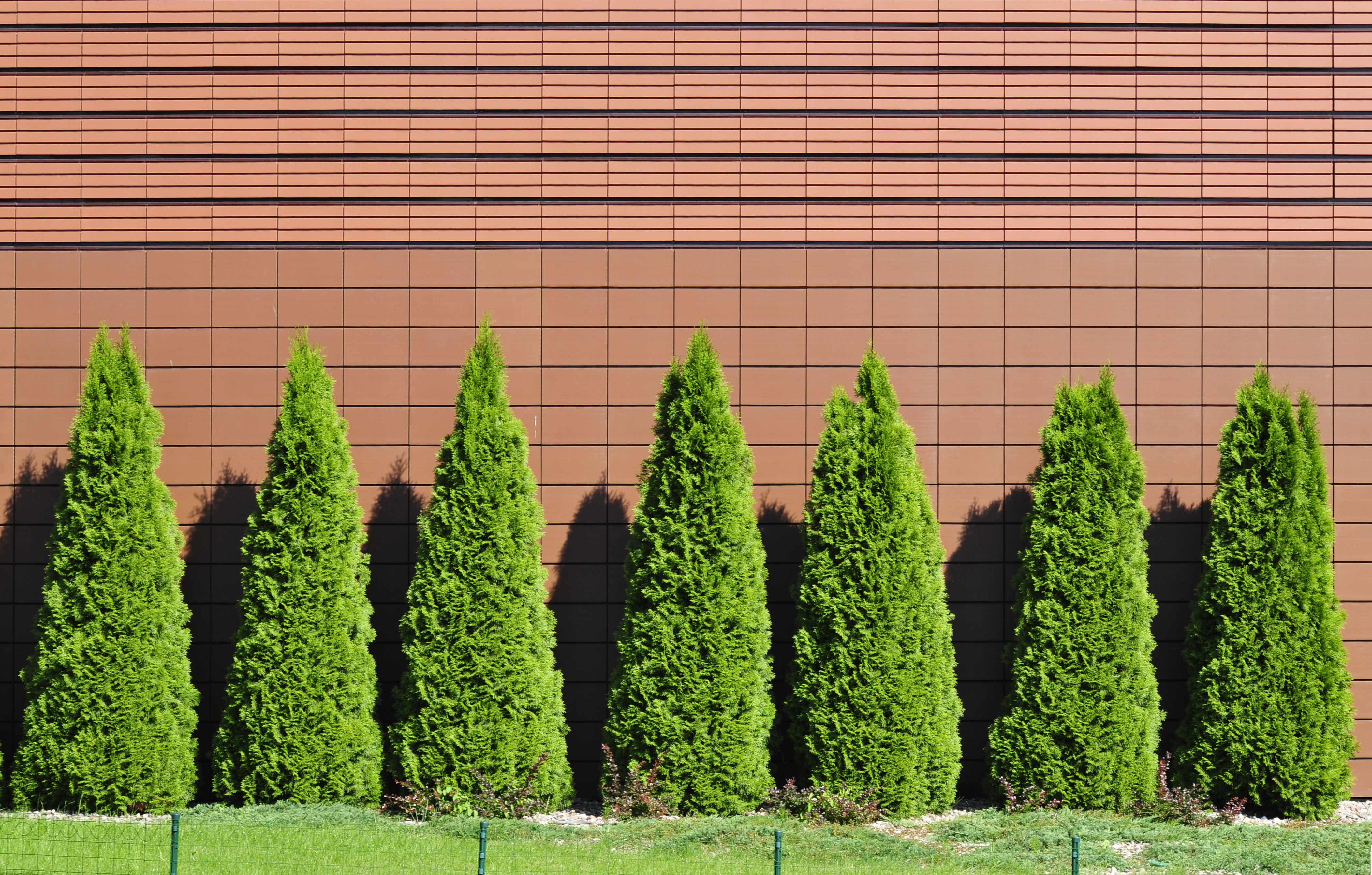
The best trees for privacy will not only keep those nosey neighbors at bay, but it will also add character and color to the exterior of your home. While your standard fencing can provide a sense of seclusion — tall, fast-growing trees is a charming way to screen a property and welcome natures abundant beauty into a space.
'Trees are great for screening the zones above a property fence and if there is space, they can be allowed to grow wide as well to provide even more privacy beneath a spreading canopy,' says Megumi Aihara (ASLA, PLA), founding partner and principal of landscape and architecture studio SAW.
If you're redoing your backyard, and looking for affordable privacy trees, then these shrubs could be a great addition — take a look at the list we've created below.
The Best Trees For Privacy
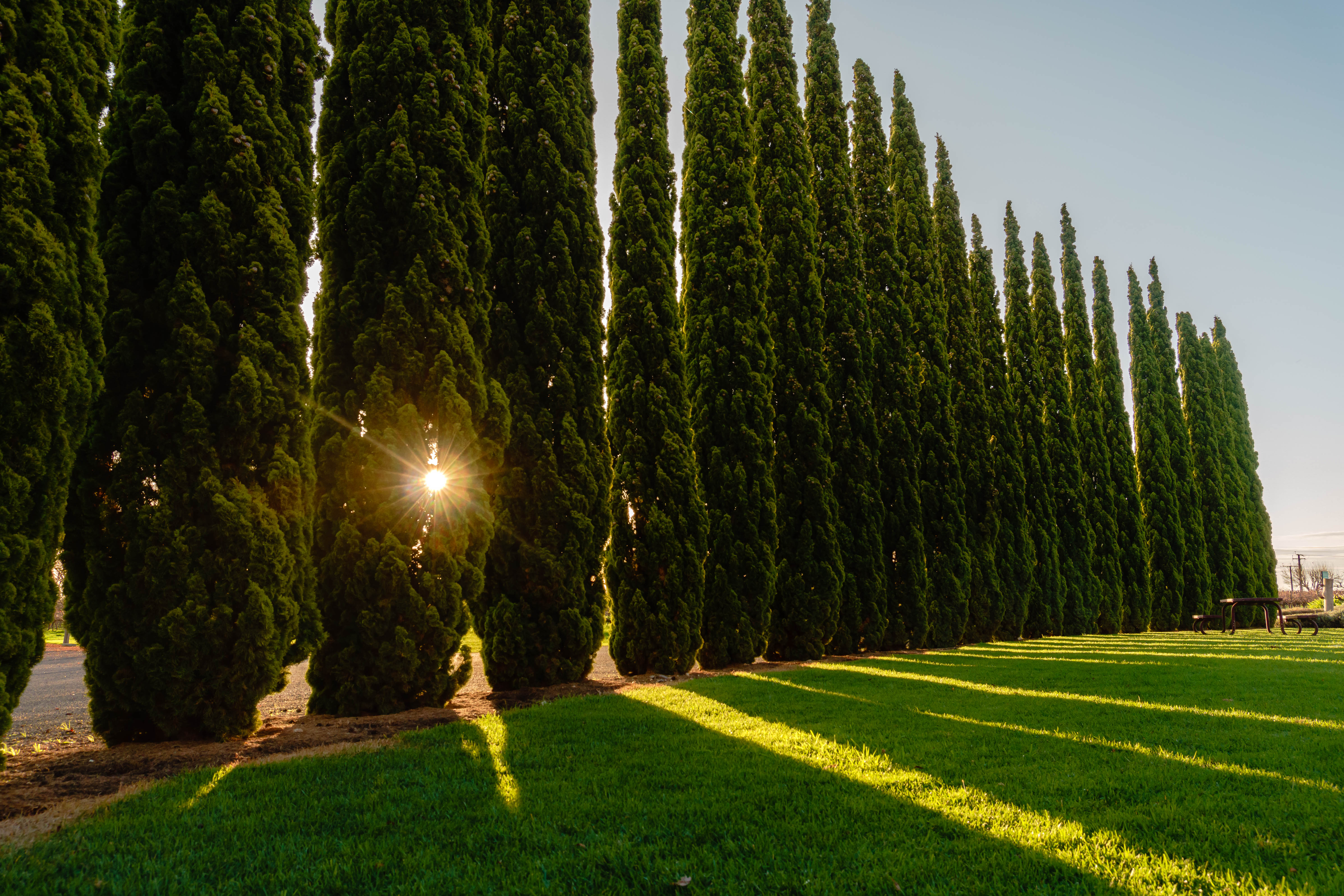
It's important to factor in the type of tree you want to add into your backyard for optimal privacy. The best way to do that is to understand what kind of tree you want to plant.
There are deciduous tress and evergreen trees. Typically, evergreen trees are the best option to get the privacy and seclusion you need. Evergreen varieties tend to keep their needles or pines all year round, whereas deciduous trees lose their leaves in autumn. Carolin Sousa, Horticultural expert and founder of landscaping firm CSRenders, LLC tells us: 'Evergreen trees will lack any sort of ‘wow’ factor throughout the year, but will provide year-round, green privacy. Some people elect to plant a deciduous privacy tree to still enjoy a Spring and Summer flower, while others prioritize winter privacy'.
In terms of design, Carolin says: 'Some plants take better to being cut and hedged than others. Depending on your application, this might be very important for the space. If you’re looking to hedge a tree or shrub, you can also more-or-less disregard the size at maturity, which will open up your plant selection further'.
Without further ado, here are our top picks for the best privacy trees.
1. Carpinus betulus 'Fastigiata'

Want to give your garden height and a feeling of enclosure? Consider Carpinus betulus, which is one of the best trees for a fence line.
'This tree grows best in full sun, and is great for creating privacy, as it starts at about 2’-3’ up from the ground,' says Kat Aul Cervoni, landscape designer and founder of Staghorn NYC and The Cultivation by Kat. 'Consider this one to add seclusion in addition to a fence or to go behind a planting bed with shrubs and perennials. These are also great for areas short on space as they are very tall and narrow. The trees require yearly pruning and you can give them a tightly clipped oval shape or train them into a lovely hedge. They are hardy, disease-resistant, and easy to care for.'
'Their leaves are marchesant, meaning, they stay attached to their branches after they’ve dried up at the end of the year,' says Kat. 'This extends the amount of time during the year where they give full privacy and it also means their branches are only bare for about 1 month of the year while the new foliage grows each spring.'
Hardiness zone: 4-8
Height: 30-40 feet tall
Sunlight: Best in parital shade, but will grow in full sun
Soil Type: Well-drained, moist soil
2. American Holly

Ilex Opaca or American Holly is one great example of how to use plants to create privacy in the backyard. This variety is quickly becoming a garden trend; an evergreen, with a wide, upright pyramidal form that is native to the eastern United States.
'It's known for its thick-almost-leathery spiny leaves that are deep green in color,' says Kat. 'If a male tree is allowed to grow nearby, a female holly will produce bright red berries in the fall. While in a garden they typically grow between 15'-35' in height, they can also reach up to 50'-60' in the wild. American holly prefers full sun to light shade and fertile, moist-but-well-drained soil.'
Hardiness zone: 5-9
Height: 15-30 feet tall
Sunlight: Partial shade with some full sun exposure
Soil Type: Well drained, sandy soil
3. Thuja 'Green Giant'

Thuja, or Arborvitae, is widely regarded as one of the best evergreen trees for privacy. 'These are the classic border trees,' explains Erinn Witz, gardening expert and co-founder of Seedsandspades.com. 'When planted densely, they form a robust hedge that effectively screens you off from the outside world.'
Thuja Green Giant is a popular choice because it's thick, evergreen, easy to grow, and can reach lofty heights and widths, which makes it the perfect choice for an almost wall-like screen. They can grow to more than 40 feet, and grow fast, too — as much as three feet per year.
Thuja is an attractive prospect in terms of creating a low-maintenance garden, too. 'Arborvitae are low-maintenance — as long as they have well-draining soil and plenty of water, you only have to fertilize and trim them once or twice a year,' adds Erinn.
Hardiness zone: 6-8
Height: 50 to 60 feet tall
Sunlight: Direct sunlight
Soil Type: Well-drained, Loamy soils
4. Emerald Green Arborvitae

If you're only working with a small backyard, a hulking Green Giant may seem like an overkill, and quickly outgrow your space. Instead, consider an Emerald Green Thuja, which grows a much more reasonable 6 inches a year.
'Emerald Green’ arborvitae is an evergreen tree with an upright pyramidal habit suitable for privacy hedging,' explains Janet Loughrey, gardening expert and writer at Garden Design. 'Plants reach just 10-15 feet tall and 3-4 feet wide at maturity, making this a good alternative for smaller yards.'
Hardiness zone: 3-8
Height: 10-15 feet tall
Sunlight: Direct sun
Soil Type: Moist, well-drained
Price: $19.95 for smallest $199.95 for largest
Height: 1-2ft to 5-6ft
5. Magnolia Grandiflora

Also known as Southern Magnolia, the Magnolia grandiflora is a large, upright pyramidal evergreen tree that is famous for its leathery, oversized dark green leaves and large, highly fragrant white flowers. These can add a decorative, maximalist touch and can be the best privacy tree for small backyards.
'Their glossy, dark green evergreen leaves are often used in holiday decor and have brownish undersides,' says Kat. 'Their flowers also produce unique seedpods covered in red berries. This long-lived tree is native to the southeastern US and prefers full sun to light, partial shade, and fertile, moist-but-well-drained soil. These trees typically grow up to 60'-80' high, though can reach heights of over 100' in the right conditions and with old age New cultivars that are much smaller and more cold tolerant have become popular for people with smaller garden spaces such as 'Little Gem' and 'Brackens Brown Beauty.'
Hardiness zone: 7-9
Height: 60-80 feet tall
Sunlight: Full sun to light shade
Soil Type: Loamy, moist soils
6. Cypress trees
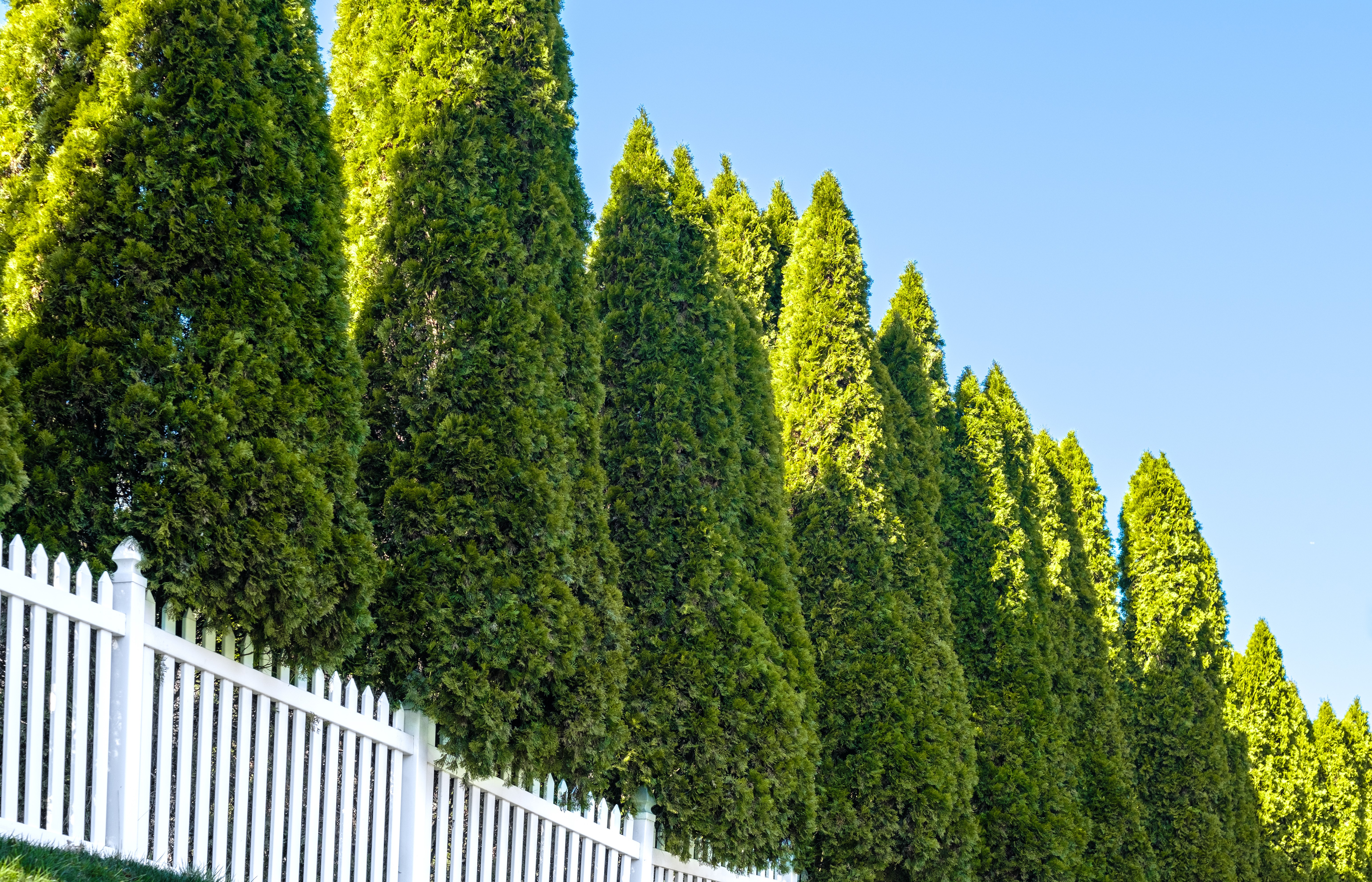
According to Jackie Sons, founder of Native Wildflower Nursery, Leyland cypress trees are the most popular with clients looking to create privacy in their yards. 'They will provide green foliage all year round, and they are fast growing so it does not take long for them to fill in,' Jackie explains.
Chris Patch, founder of the gardening site Garden Benchtop, agrees. 'With their recognizable conical shapes, Leyland cypress are the perfect specimens to grow in a row along a boundary line. Importantly, they can grow at an impressive 24 inches annually, which means you'll have your precious privacy in no time.'
When several plants are placed close together, the cypress also makes an excellent option for a best fast-growing hedge for privacy.
Hardiness zone: 5-10
Height: 40-60 feet tall
Sunlight: Direct sun
Soil Type: Sandy, Loamy soil
7. Dogwood
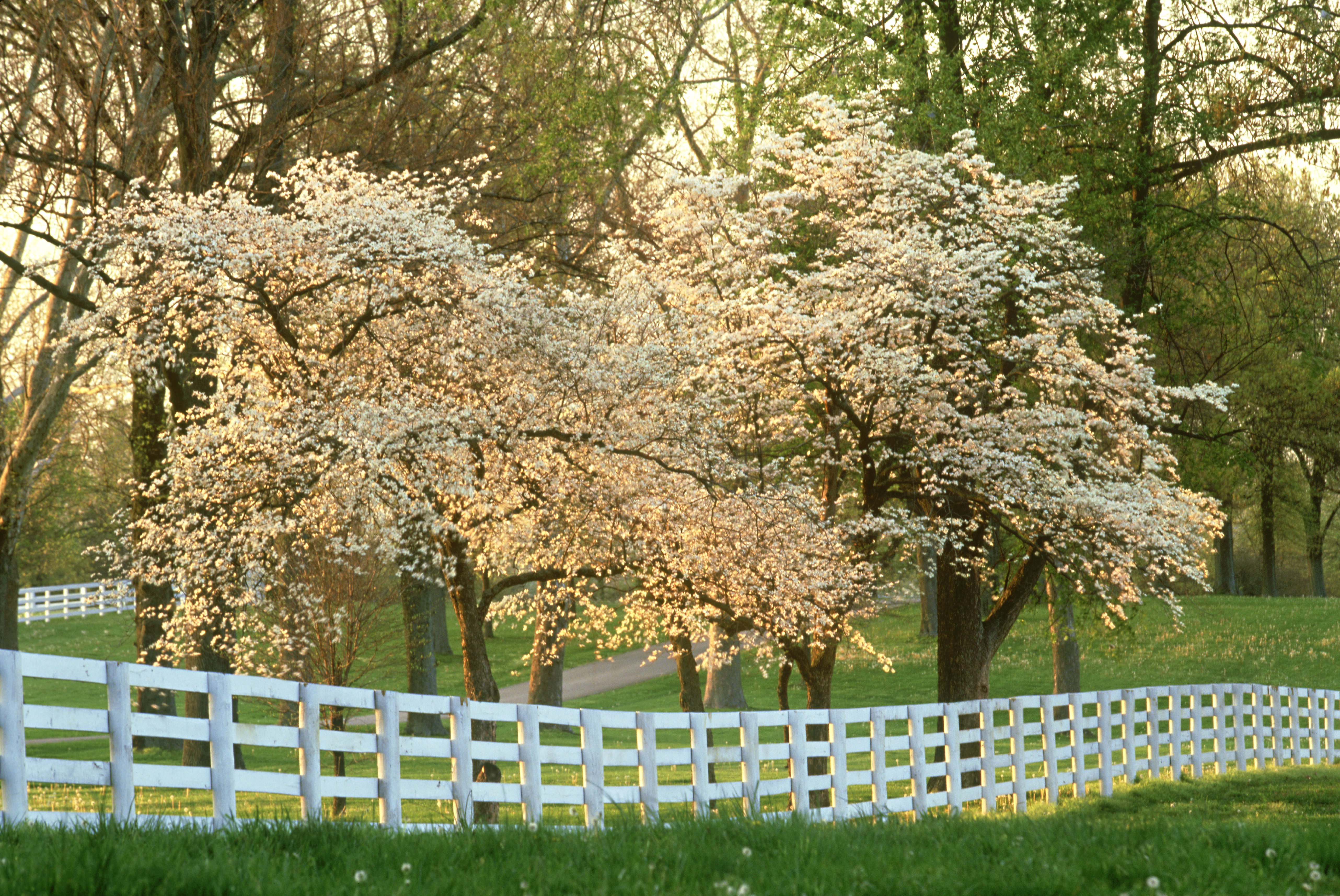
You might think that all of the trees landscapers' have suggested for privacy would be evergreen, but it's worth considering that privacy isn't so much of a concern in the winter months, especially if it's just preventing your backyard from being overlooked.
The trade-off in opting for a deciduous is the potential for more low-lying winter sun, and the choice of some beautiful blooms in springtime, like the flowering Dogwood tree. 'Dogwood creates a spacious shade canopy that screens out unsightly views, adding privacy to a front or back yard,' says Janet. 'This deciduous tree comes in different sizes and produces flowers, fruit attractive leaves and bark for multi-seasonal appeal.'
Dogwoods can even be grown in large, well-drained containers, meaning you can add privacy to a patio or deck through container gardening.
Hardiness zone: 5-9
Height: 15-30 feet tall
Sunlight: Full, partial shade
Soil Type: Well-drained, moist soil
8. Spartan Juniper

If you're looking for another alternative to Thuja or cypress trees to create privacy in your backyard, spartan juniper is an attractive option for its robust characteristics.
'Spartan junipers are hardy against heat, cold, and drought, so they can happily grow almost anywhere,' says Erinn. 'The trees reach a maximum height of about 20 feet, or you can keep them pruned into a shorter conical shape.'
This type of juniper is one of the best trees for small gardens for one key reason. 'Another plus of the spartan juniper is that the foliage grows close to the trunk, so there aren’t a lot of unruly branches to deal with,' Erinn explains.
Hardiness zone: 4-9
Height: Up to 20 feet tall
Sunlight: Direct sun
Soil Type: Moist, well-drained soil
9. Wax myrtle
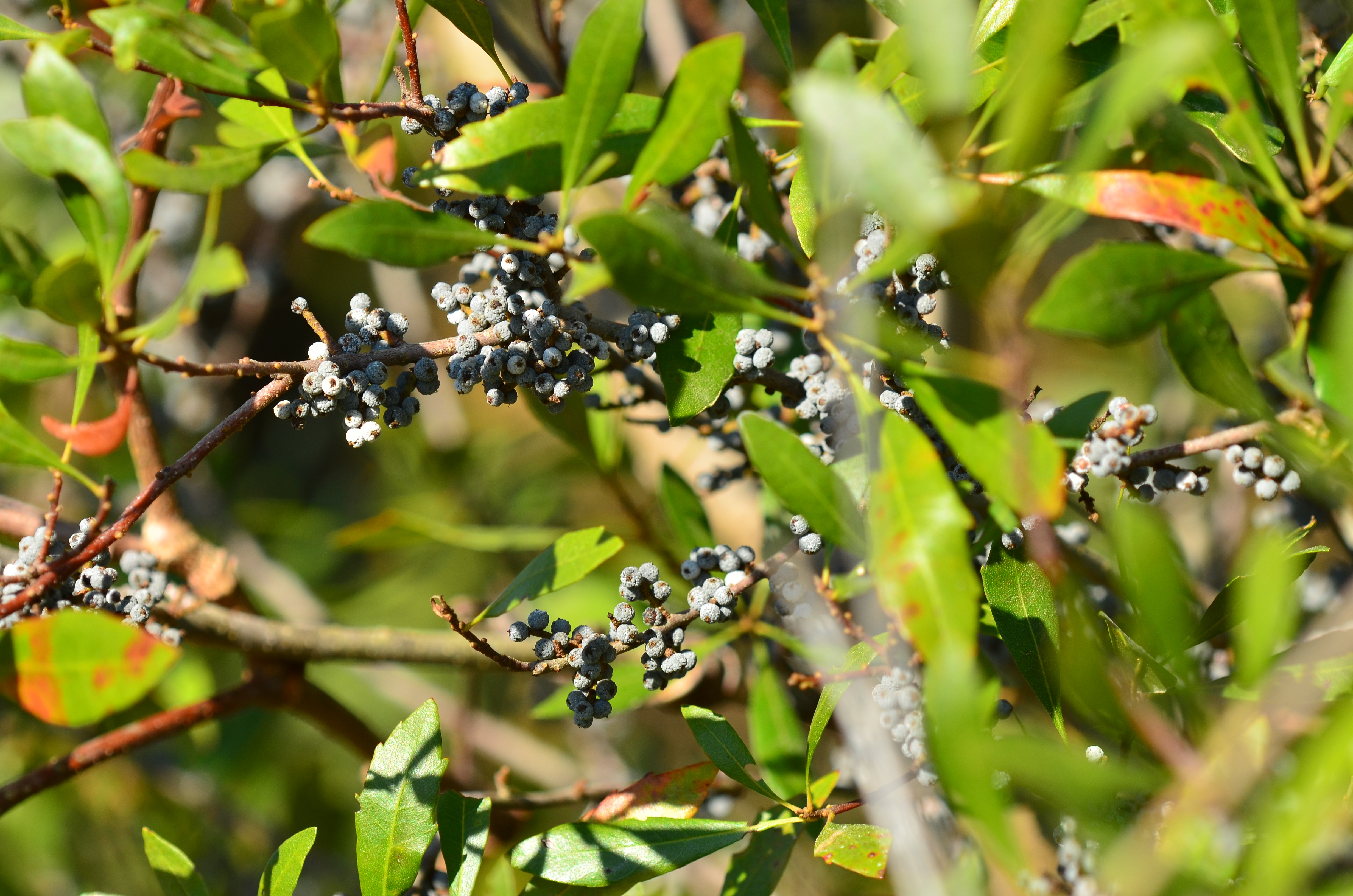
If you're looking for a fast-growing privacy tree, wax myrtle is hard to beat. It can grow between three and five feet a year in the right conditions, but despite this, its maximum growth isn't enough to overwhelm a more compact backyard.
'For smaller spaces, wax myrtle trees produce a dense wall of privacy while also staying at a more compact size,' Erinn explains. 'You can shape them into the traditional hedgerow shape if you plant several trees in a line, or you can use just one or two wax myrtles to screen off a front porch or sitting area.'
Hardiness zone: 7-10
Height: 15 to 20 feet tall
Sunlight: Direct sun
Soil Type: Moist, Loamy soils
10. Bamboo

If we're talking fast-growing, we can't ignore bamboo - though it's not, technically, a tree. Bamboo can make for an effective screen for your backyard and looks particularly good if you're trying to channel a Japanese garden through your design.
'It's hard to look past one of the fastest-growing plants in the world, the humble bamboo,' agrees Chris. 'Not only can it grow over a foot in a day to quickly establish a green privacy screen, but bamboo is also low maintenance and creates a beautiful, dense natural wall.'
If you're nervous about planting bamboo, just remember to plant a type that's far less likely to spread. 'I suggest looking at the clumping variety that doesn't send out runners,' Chris says.
Hardiness zone: 4-10
Height: 15-60 feet tall
Sunlight: Direct sun
Soil Type: Well-drained, fertile soils
11. PINUS FLEXILIS 'VANDERWOLFS PYRAMID'

Another great contender for urban gardening, aesthetics, and privacy is the Pinus flexilis, commonly called limber pine.
'This low-maintenance tree grows best in full sun, and like most pines, it can handle drought once established,' says Kat. 'It stays relatively narrow and tall, usually up to 20’-30’ in height. It has evergreen needles with a uniquely blue-grey tint, and the tree requires little-to-no pruning to maintain a tidy, dense pyramidal shape.'
Hardiness: 4-7
Height: 25-60 ft tall
Sunlight: Direct sun
Soil Type: Well-drained
12. YEW

In many incarnations, Yew trees look more like a hedge and are often used as a more formal privacy planting than can be easily shaped to bring structure to patio or deck planting.
'Yew is amenable to regular pruning,' Janet tells us. 'This evergreen tree comes in different shapes and sizes, is hardy in most regions, and is tolerant of a range of growing conditions.'
Hardiness: 2-10
Height: 35-65 ft
Sunlight: Full sun, partial shade
Soil Type: Rich, Loamy soil
13. MAPLES

Maple trees are deciduous, so they're not the best choice where you require privacy year around, but where evergreen screening isn't so necessary, maples are great for their dense leaf coverage, and a seasonal show of color when the leaves turn fiery red before they drop.
'Red maples are widely regarded as the best for creating screening and outdoor shade, but a Japanese maple can work in the right conditions, too,' says Erinn.
Hardiness Zone: 5-9
Height: This depends on the variety. Japanese maple can grow from 2 ft - 25 ft tall.
Sunlight: Full sun
Soil Type: Sandy
FAQS
What characteristics should I look for in privacy trees?
There are plenty of other trees out there that are great for creating privacy in a yard if you only know what to look for. 'Choose trees based on attributes such as hardiness, low maintenance, and multi-seasonal attributes,' says Janet.
Here are some of the key considerations when choosing the best trees for privacy.
Speed of growth: Privacy is something you won't want to have to wait for your garden to grow into, and mature trees can be a huge expense. Fast-growing varieties are an option but tread carefully. They can often be invasive, as well as being weaker and more susceptible to disease and rot, which may limit their lifespan.
Size: With fast-growing trees comes the potential for your planting to quickly become too big for your backyard. 'For smaller yards, select dwarf varieties that won’t outgrow their space,' says Janet.
Maintenance: While you want private trees to grow and screen your backyard, if you choose a tree that's too fast-growing, that simply means more maintenance to keep it under control. Think about the garden clear-up required with deciduous and flowering trees, too.
Seasonal attributes: Choosing between deciduous and evergreen trees is even more important when it comes to privacy - after all, luscious deciduous trees that provide a screen from neighbors in spring and summer can leave your space completely on show during the winter. Consider also that the sun may be lower in the sky in winter, so large privacy trees may block more light from reaching your backyard and even into your home.
What should you keep in mind before planting these trees?
Not every tree recommended by experts will be right for your backyard. There are myriad factors you also need to take into account, which should be researched before you invest in planting for your backyard. 'When it comes to the best trees for creating privacy in a backyard, it depends largely on the size of the area and climate,' says professional landscaper Tom Monson, owner of Monson Lawn & Landscaping.
'Some trees are better suited for warmer climates, while others do better in cooler climates,' Tom adds. 'No matter what trees you choose, be sure to research the varieties that work best in your climate and soil conditions, and plant them in the right position to ensure that they have enough space to grow and thrive.'
You should also refer to the USDA plant hardiness zone of your area when tree landscaping.

